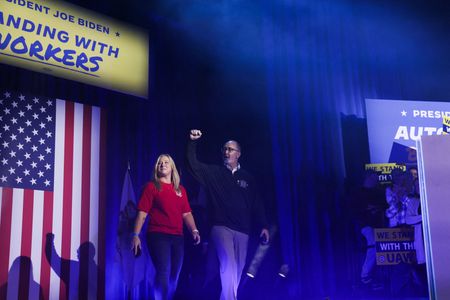By David Shepardson
WASHINGTON (Reuters) – United Auto Workers President Shawn Fain will tell a Senate Committee on Tuesday the union plans to aggressively organize non-union U.S. auto plants after winning new contracts with the Detroit Three automakers.
“For decades, non-union auto companies have used fear, uncertainty, and division to break union drives in our industry,” Fain will tell the Senate Health, Education, Labor and Pensions Committee, according to written testimony seen by Reuters. “I’m here to promise you that those days are over…. We are going to organize like we’ve never organized before.”
The UAW for decades has unsuccessfully sought to organize auto factories operated by foreign automakers.
Hyundai Motor said on Monday it will hike wages for nonunion U.S. production workers by 25% by 2028, weeks after the UAW won new contracts with General Motors, Ford Motor and Chrysler parent Stellantis.
The Korean automaker joins Toyota Motor and Honda Motor in raising U.S. factory wages after the UAW won a new contract that will result in wage increases of 25% through 2028 and other benefits.
“We know these non-union companies are doing this because they’re scared,” Fain’s testimony says. “They’re scared that their workers will see that a better life is possible once they organize into a union. And these companies are trying to head that off.”
The hearing will also include testimony from Teamsters President Sean O’Brien and Association of Flight Attendants President Sara Nelson.
Nelson’s testimony also cited Honda’s wage hikes.
“If non-union firms want to attract and retain qualified workers, they must compete with the unionized workers’ pay, benefits and working conditions,” her testimony says. “The more of us who are unionized, the more pressure all employers face.”
When U.S. President Joe Biden visited Illinois last week, he said he backed the UAW’s efforts to unionize Tesla and Toyota, adding that all U.S. auto workers deserve a deal similar to the UAW’s recent agreements with the Detroit Three.
(Reporting by David Shepardson, editing by Deepa Babington)

